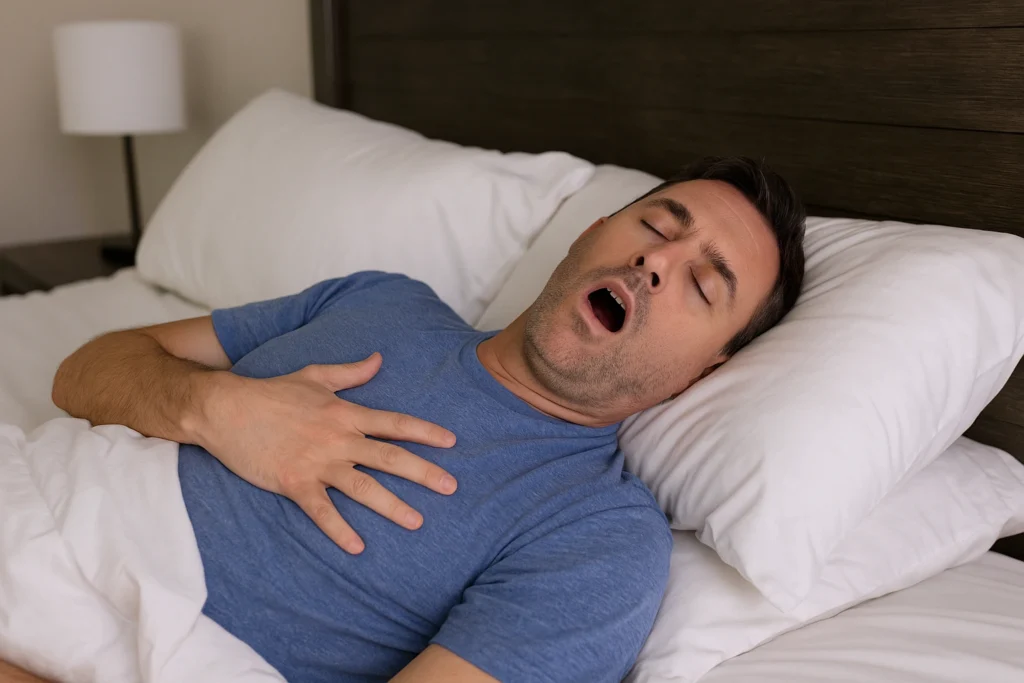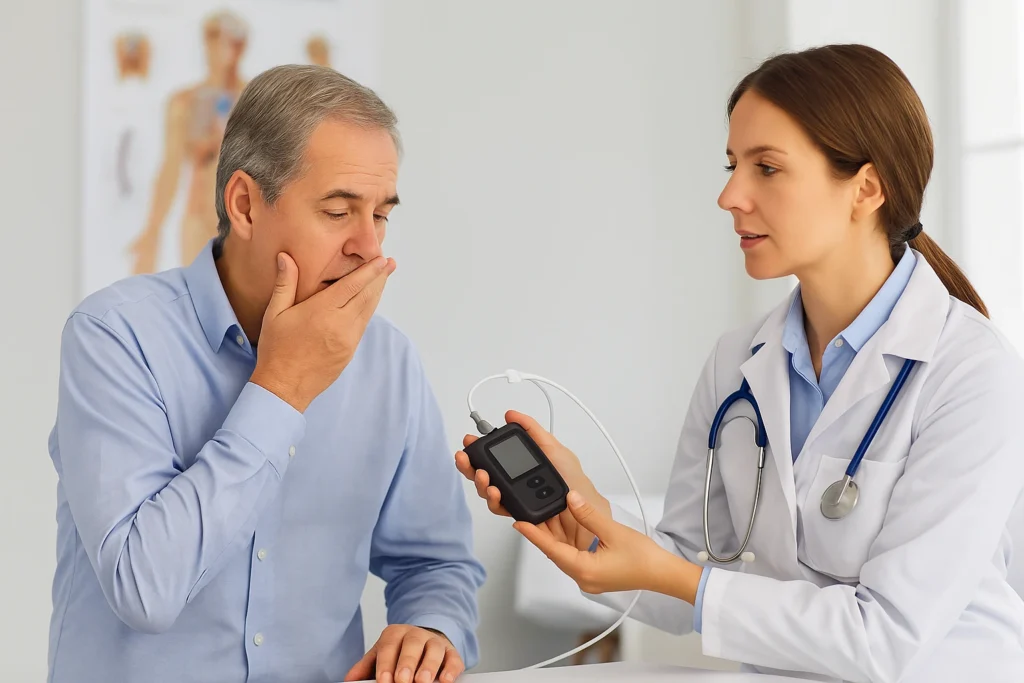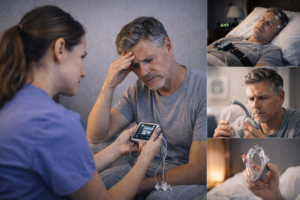Sleep Apnea Symptoms and Types
Sleep apnea is a disorder where your breathing repeatedly stops and starts during sleep, disrupting your rest and potentially leading to serious health complications. The most common type is obstructive sleep apnea (OSA), which occurs when the throat muscles intermittently relax and block the airway during sleep. This obstruction can cause you to wake up frequently, gasping for air, although often you may not be aware of these interruptions.
Beyond obstructive sleep apnea, there are other types, such as central sleep apnea, where your brain fails to send proper signals to the muscles that control breathing. Complex sleep apnea syndrome, also known as treatment-emergent central sleep apnea, is a combination of both obstructive and central sleep apnea. Understanding these distinctions is crucial for tailoring the most effective treatment plan.
Recognizing Sleep Apnea Symptoms
Recognizing the symptoms of sleep apnea is the first step towards getting help. Common symptoms include:
- Loud snoring, which is often more disruptive to sleep partners than to the person snoring.
- Episodes of stopped breathing during sleep, which may be observed by another person.
- Gasping for air during sleep, which can be alarming and lead to frequent awakenings.
- Awakening with a dry mouth due to breathing through the mouth instead of the nose.
- Morning headache, a result of oxygen deprivation and disrupted sleep.
- Difficulty staying asleep (insomnia), which can exacerbate other symptoms of sleep deprivation.
- Excessive daytime sleepiness (hypersomnia), affecting daily activities and alertness.
- Difficulty paying attention while awake, impacting cognitive function and productivity.
- Irritability, which can strain relationships and affect mental health.
If you experience these symptoms, particularly loud snoring and excessive daytime drowsiness, consider consulting a healthcare professional. Early intervention can prevent complications and improve overall health and well-being.
Risks of Untreated Obstructive Sleep Apnea
Ignoring sleep apnea can lead to severe health consequences. Here are some risks associated with untreated sleep apnea:
- Sleep apnea can increase the risk of high blood pressure, heart attacks, and strokes due to the frequent drops in blood oxygen levels during episodes of apnea. These fluctuations can strain the cardiovascular system, leading to long-term damage. Moreover, sleep apnea is often associated with arrhythmias, or irregular heartbeats, which can further complicate cardiovascular health.
- The link between sleep apnea and cardiovascular disease is well-documented, highlighting the importance of early diagnosis and treatment. Effective management of sleep apnea can significantly reduce these risks, underscoring the need for awareness and proactive healthcare measures.
- The repeated awakenings associated with sleep apnea make restorative sleep impossible, leading to severe daytime drowsiness, fatigue, and irritability. This can affect your work performance and increase the risk of accidents, particularly those involving motor vehicles. Sleep deprivation impairs reaction time, decision-making, and concentration, making everyday tasks more challenging and hazardous.
- Chronic fatigue can also have emotional and psychological impacts, contributing to depression and anxiety. The social and occupational consequences of untreated sleep apnea can be profound, affecting quality of life and personal relationships.
- There’s a link between sleep apnea and metabolic disorders like diabetes. The stress on the body from interrupted sleep can worsen insulin resistance, making diabetes management more difficult. Additionally, people with sleep apnea are more likely to have abnormal results on liver function tests and may have a higher risk of liver scarring, known as nonalcoholic fatty liver disease (NAFLD).
- The interplay between sleep apnea, metabolic health, and liver function illustrates the systemic nature of this sleep disorder. Addressing sleep apnea can lead to improvements in metabolic health, offering a comprehensive approach to managing associated conditions.
- Sleep apnea can pose problems with certain medications and general anesthesia. Individuals with sleep apnea may be more likely to have complications after major surgery because they’re prone to breathing problems. Anesthesia can exacerbate these issues, leading to prolonged recovery times and increased risk of postoperative complications.
- It’s crucial for healthcare providers to be aware of a patient’s sleep apnea status when planning surgical procedures. Proper management can mitigate risks, ensuring safer surgical outcomes and recovery processes.
Sleep Apnea Diagnosis and Testing Options
A sleep apnea diagnosis often involves a sleep study, which can be conducted in a sleep center or at home using a home sleep apnea test. This test monitors your breathing patterns and other body functions during sleep.
A home sleep apnea test is a simplified breathing monitor that tracks your breathing, oxygen levels, and heart rate. It provides a convenient way to diagnose sleep apnea without an overnight stay in a sleep center. This option is particularly appealing for those who prefer the comfort of their own home, though it may not capture as much detailed data as an in-lab study.
While home tests are useful for diagnosing moderate to severe cases, a full polysomnography in a sleep clinic remains the gold standard for comprehensive assessment. It’s essential to consult with a healthcare provider to determine the most appropriate diagnostic approach for your situation.

Sleep Apnea Treatment Options
Treatment for sleep apnea is crucial for improving your quality of life and reducing health risks. Here are the most common treatment options:
Continuous Positive Airway Pressure (CPAP) is the most common and effective treatment for obstructive sleep apnea. It involves using a machine that delivers air pressure through a mask placed over your nose or nose and mouth while you sleep. This pressure keeps your airway open, preventing apnea and snoring.
While CPAP is highly effective, some individuals find it challenging to adjust to wearing a mask during sleep. However, advancements in mask design and machine technology have improved comfort and usability, making CPAP a viable option for many patients. Ongoing support from healthcare providers can enhance compliance and outcomes.
For those who struggle with CPAP therapy, there are alternatives:
- Oral Appliances: These are custom-made devices designed to keep your throat open by bringing your jaw forward, which can be beneficial for mild to moderate sleep apnea. They are portable, easy to use, and often preferred by those who find CPAP uncomfortable.
- Lifestyle Changes: Losing weight, exercising, and avoiding alcohol and smoking can alleviate symptoms in some people. These changes not only improve sleep apnea but also enhance overall health.
- Positional Therapy: Some people only experience apnea when sleeping on their back. Positional therapy involves training oneself to sleep in a side position, potentially reducing apnea events.
- Surgery: In some cases, surgical options may be considered, such as tissue removal, tissue shrinkage, or jaw repositioning. Surgery is typically reserved for severe cases or when other treatments have failed, and it requires thorough evaluation by a specialist.
- BiPAP or APAP Devices: These are alternatives to CPAP that provide more flexibility in air pressure settings, accommodating varying needs throughout the night.
- Nerve Stimulation: A device is implanted that stimulates the nerve controlling tongue movement to keep the airway open. This innovative approach is suitable for certain patients and offers a less invasive alternative to traditional surgery.
Conclusion: Managing Sleep Apnea for Better Health
Sleep apnea is a serious condition that can lead to significant health issues if left untreated. Recognizing the symptoms and seeking a proper diagnosis is crucial. With numerous treatment options available, including CPAP therapy and its alternatives, you can manage sleep apnea effectively and improve your quality of life. Always consult with healthcare professionals to determine the best course of action for your specific situation.
Understanding sleep apnea is the first step towards better sleep and better health. Prioritize your well-being by addressing sleep apnea symptoms and exploring appropriate treatments with your healthcare provider. Remember, effective treatment can lead to a more restful sleep, improved health, and a better quality of life. By taking proactive steps, you can safeguard your health and enjoy the benefits of restorative sleep.





